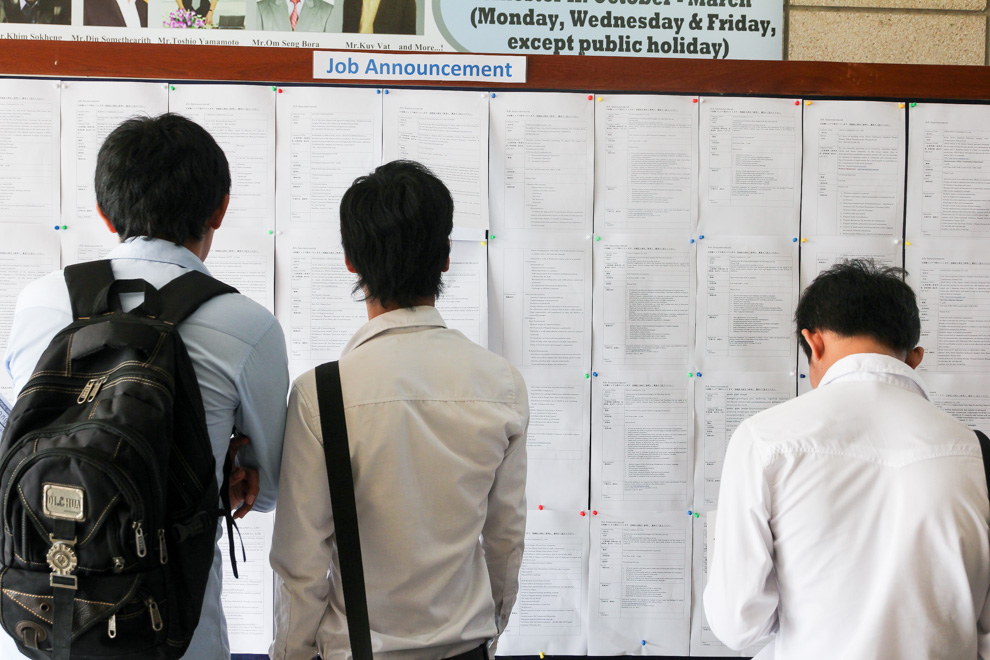
Students peruse a job announcement board in 2013 during a career and recruitment day in Phnom Penh’s Tuol Kork district.
The decelerating world economy is having far-reaching effects on unemployment, with new research projecting that the number of people out of work will grow to nearly 200 million this year, with millions of additional workers left vulnerable in developing countries, including Cambodia.
Global unemployment reached 197.1 million in 2015 and is expected to rise by nearly 2.3 million this year and a further 1.1 million in 2017, with the majority of this increase taking place in emerging economies, the International Labour Organization (ILO) said in its report, World Employment and Social Outlook – Trends 2016.
It said efforts to reduce the share of working poor had stalled and an estimated 327 million employed people were living in extreme poverty, while nearly a billion more were in moderate or near-poverty.
ILO senior economist Steven Tobin said slower economic growth in major emerging economies, notably China, was expected to put 3.4 million people out of work in the next two years and affect workers in countries with close economic ties.
“The slowdown in China – which accounts for 40 per cent of Asia-Pacific’s total output – is weighing heavily on the region,” he told the Post.
“And while unemployment is expected to rise modestly in Cambodia as a result, the challenge facing Cambodia is more one of job quality.”
Tobin said unemployment – officially at less than 1 per cent of the labour force – was not a major issue in Cambodia as those in extreme poverty, living on less than $1.90 per day, typically take on low-paying jobs to survive.
“A more telling indicator for the region is the working poverty rate, that is, the share of the employed population living below the extreme poverty line, which in Cambodia according to the latest data was estimated at 20.6 per cent in 2015, translating to almost 1.8 million people,” he said.
This is more than twice the average for Southeast Asia and significantly higher than the 2015 world average of 12 per cent.
While the ILO report noted that the number of people living in poverty in Southeast Asia had declined considerably since 2000, vulnerable employment – referring to own-account or unpaid family work – remains comparatively high across the region.
“Countries with large informal sectors, such as Cambodia, Indonesia and Myanmar, continue to have high shares of vulnerable employment, in the order of 60 per cent, and there are no signs that they will decrease over the next couple years,” it said.
Jayant Menon, lead economist for the Asian Development Bank (ADB), said the continuous influx of foreign investment in Cambodia has provided employment opportunities for its citizens, keeping the Kingdom’s unemployment rate remarkably low. The bigger challenge for the labour sector, he said, was underemployment, where people are not employed to their fullest capacity.
“The problem in Cambodia is underemployment, which I think is a problem in agriculture in particular,” Menon said. “[The sector] is not very productive because of the small scale of farms and limited amount of capital.”
Ath Thorn, president of the Cambodia Labour Confederation, said people who do informal jobs, such as cultivate their family farm, “only have jobs three months out of the year”. Meanwhile, those who work as motodops, for instance, can have highly irregular and meagre income.
Thorn said people are forced to go into the informal sector because the demand for jobs is higher than the supply and many people do not have the required skill set for the jobs that are available.
In a report titled Cambodia, Addressing the Skills Gap, launched yesterday, the ADB said the main challenge for the Kingdom’s labour market was to improve the quality of employment.
“Much of the employment is informal, vulnerable, unstable and poorly rewarded,” it said. “Therefore, the main issues in the labour market include skills mix, working conditions and earnings.”
The report noted that micro-, small- and medium-sized enterprises (MSMEs) account for 99.8 per cent of all business establishments in Cambodia, of which just a fraction are registered with the Ministry of Commerce.
“While their contribution to employment opportunities is positive, employment quality still needs to be improved, as jobs in MSMEs are perceived to be less secure, poorly remunerated, with little opportunity for self-improvement compared to large enterprises,” it said.
Heng Sour, director-general of administration and finance at the Ministry of Labour and Vocational Training, said the government must make more effort to encourage growth of the formal economy, which would improve the quality of jobs and offer better protection to workers.
“We have to find ways to transition the informal economy to the formal economy by easing the business registration [process], developing interpersonal skills in the formal and informal sector, and giving consultation support for any difficulty [workers] are facing,” he said.
Contact PhnomPenh Post for full article
Post Media Co LtdThe Elements Condominium, Level 7
Hun Sen Boulevard
Phum Tuol Roka III
Sangkat Chak Angre Krom, Khan Meanchey
12353 Phnom Penh
Cambodia
Telegram: 092 555 741
Email: [email protected]












